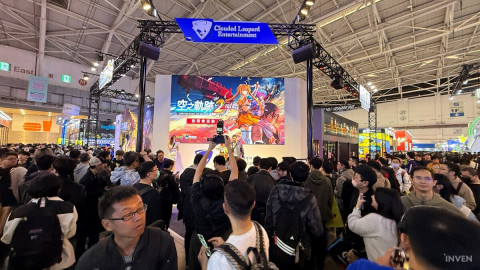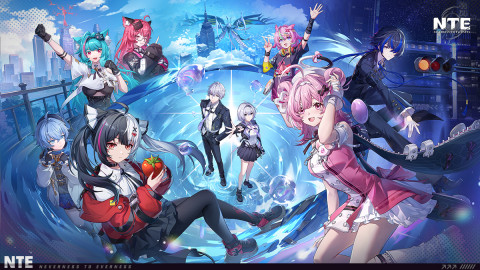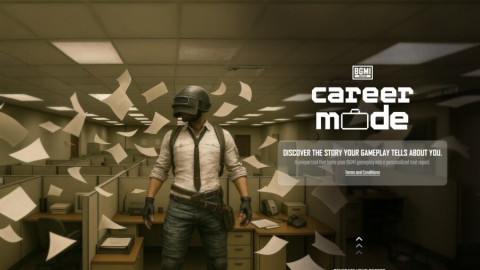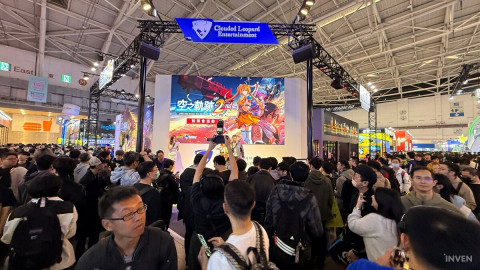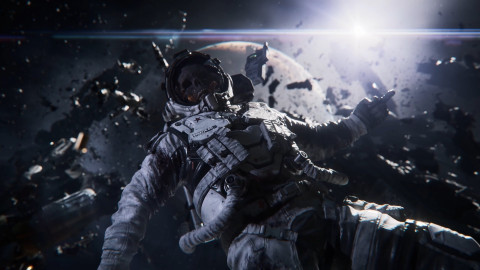
Hearthstone is making sweeping changes in 2020, Hearthstone's Year of the Phoenix. Six years after the king of digital card games went live, more new content than ever is being added. Demon Hunters, class reworks, new Ranked systems and free decks for returning players—the list goes on. Hearthstone's Game Director Ben Lee and Production Director Nathan Lyons-Smith spoke to us about how these sweeping changes came to be, and what they mean for the future of Hearthstone.
This seems to be a new chapter for Hearthstone. There is a ton of content coming, and there's a whole new game mode that's been receiving a lot of support. Does it feel like a new chapter for the game to you too?
Lee: To some degree, yes. We chose the phoenix as the animal for the celestial year for a bunch of reasons. First of all: phoenixes are just really cool. But second of all, it's kind of a reinvigoration, to some degree. We did a lot of work on the Year of the Dragon, and we got a lot of new members on the team during that year and the year before it. We start to see the first elements of that change come to fruition. We've been working on Demon Hunter for a year, Hearthstone Battlegrounds was something we worked on for some time.
We're working on other things too, like a new way to play Hearthstone, or more achievements in-game. We really want there to be a lot more content in the game. We want there to be more to do for players. Any live service game that's out there has new things to do pretty often. Hearthstone traditionally has done that less so, and we think the game is at a point in its life cycle where we need to give players new things to do.
Lyons-Smith: We love the game. We're players ourselves and we want to provide more. We're making major investments to make Hearthstone a great experience.

Ranked Mode is receiving a lot of attention too, with MMR and new tiers being introduced. Can you talk a bit about the changes and the ramifications it has for Hearthstone players?
Lyons-Smith: It's been a lot of work to get to this point. One of the goals for the new Ranked system was that people would get as fair of a matchup as possible. That doesn't happen as much as we'd like, right now. We're not doing it by MMR at the moment, but it's done by your placement in the ranked system. That resets pretty regularly. Because of that, folks who don't have as much time to play Hearthstone, always reset to rank 18, 19, or 20. There are a lot of people in that bucket, even former legend players. Somebody who doesn't have as deep of a collection could be matched against a former legend player—that's not a great match.
We really want to address that and provide players matchmaking based on their skill and ability. It should be really good for players that are facing former legend players. The new system doesn't really affect the high ranks. The players there are already at a point where they have to be good to be there.
Lee: The way the progression system works is that, even though your rank will be reset, you'll be playing against Legend-level players if you're a Legend-level player. The way bonus stars work is that sometimes you'll be getting ten starts for a win, but only lose one star for a loss. Even though you've been reset, the system will push you through to your rank. You'll make a lot of progression, and hopefully you'll feel very good about yourself for going up in the system.
I think one of the biggest critiques we felt about the old Ranked system is that, due to the binary nature of "win one lose one", sometimes you could end up in the same position. We've had examples where people played 100-200 games but ended up at the same rank. We want people to feel good. We want them to have fun.
Hearthstone Battlegrounds has received a lot of support and it's super successful. It almost feels like Hearthstone basically has another game in it. What does the future for Battlegrounds hold? Is it ever going to be a standalone game?
Lee: Making a new client is not something we feel is necessary. We want to keep players in Hearthstone. Asking them to download a new game is probably not a great player experience. The way we see player behavior is that there is a bunch of people who like to engage in multiple things. When we release something new they'll play it, and then traditionally go back to playing Standard. For some people, Battlegrounds has become their main mode. That's great, and we're happy about that. For us, engagement and gameplay fun are the key things. If players are coming to the game, are having fun, and stick with it, we're super happy.
Likewise, it's ok for players to take a break. If you're playing Battlegrounds and want to take a break, and then we release a big new update such as the dragons and that makes you come back: that's cool too. We just want there to always be cool, varied things for players to do. We have a very varied player base. Some people just play Arena, some love single-player modes, et cetera. Our average player engages with what's new, and moves on to the next new thing from there.
Do you ever foresee Hearthstone Battlegrounds esports becoming a thing?
Lee: I think generally we want to focus Battlegrounds more on having fun. If the community wants to go out there and create tournaments and competitions, that's something that would be cool in the future. There is a potential that, in the long term, we need to provide the ability to host eight players. It's something we talk a lot about internally, but it's a big technical challenge.
But beyond that, I personally really believe in grassroots esports. Even Hearthstone's own esports—a long time ago there were the Fight Nights with Frodan. That's where a lot of Hearthstone esports for me came from. If you look at other big games, grassroots generally is the cool thing to do. If that's something that will happen in Battlegrounds, maybe we'll embrace it and do more. I personally think that trying to force esports is not the right way to go. We'll just wait and see how it goes.
When Hearthstone was in its early days and people were hoping a tenth class would be added, many hoped for Death Knights, following World of Warcraft's path. But then we had Death Knight cards in Knights of the Frozen Throne. Does that rule out that we'll ever see Death Knights as a class in Hearthstone?
Lee: Who knows? The thing is: we'll see how this goes. We'd love to hear player feedback. If players love this, then adding more classes is definitely something we could entertain in the future. Right now we're focused on our next year with Demon Hunter and the other classes. But it's not impossible, of course.
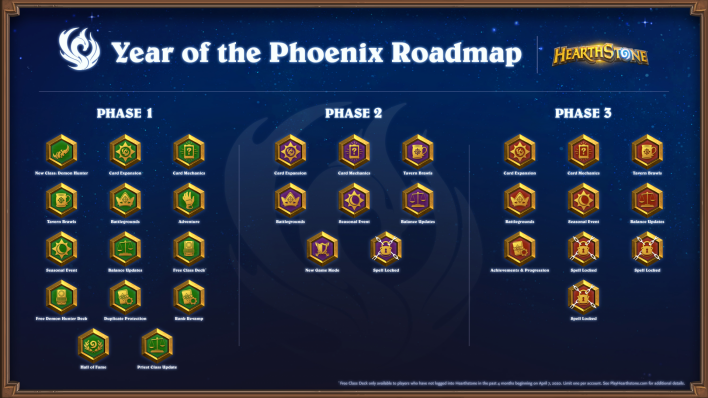
When you were creating the Demon Hunter class, when did you realize that you had 'struck gold' or at least were on the right path?
Lyons-Smith: Honestly, I can't remember a specific moment. I think the concept itself is something people just really didn't expect, since we used to do Hero Cards before.
Lee: Also, I think people before us have said that adding a tenth class is something they'd never do.
Lyons-Smith: *laughs* Yeah, I do hope that we're going to surprise and delight with actually doing the new class. But we've been iterating a lot on the hero powers. I think the fact that it only costs one mana and lets you go face is a super interesting mechanic. It really leans into the flavor of Demon Hunter and fits my personal playstyle a lot.
Demon Hunter will receive more cards than other classes in the expansions. How long do you think Demon Hunters need in order to catch up with the other classes?
Lee: It's just during the first year. We're giving them more to, as you said, catch up with the others. Demon Hunters don't have the sets from the previous years. We're also adding the "Initiate set", twenty cards, for free, so players have even more ways to catch up. Once Demon Hunters have been around for a year, in theory they'll be on the same level. That's the idea, and we hope that it works out that way. We're releasing five Neutral cards less so we can give Demon Hunters extra cards. It's still a 135 card expansion.
Losing Neutral cards is not something we're very worried about; we're very interested in pushing class identities anyway. I think the game is more fun when you're playing against a Hunter and they're playing Hunter cards instead of the same Neutrals other classes are playing.
If people respond well to 15 new class cards, do you think it's possible to expand on that and release more class cards for all classes in future expansions?
Lee: Maybe. The drawback of that is that it can make the game more expensive for people, as Neutrals work across all classes. For that reason, removing more Neutrals from expansions isn't something we would want to do. Why we would want to do it is because it can be more fun, more thematic, more beneficial to establishing the identity for the classes. So we're walking a tightrope there. We need to balance what's good for the player monetization-wise with what's fun.

Demon Hunters are getting a disruptive card: Mana Burn. Messing with your opponent's resources is something Blizzard has always been hesitant about—can you tell me what the thought process behind creating this card was?
Lee: I think we've been doing more with disruptive cards recently, especially in the Year of the Dragon. I generally agree with the core concepts that both Eric Dodds and Ben Brode used, which is to not ruin other players' fun. But I think at some level a bit of disruption is also healthy for the game. I talked a lot with Eric Dodds, the original Game Director for Hearthstone, and he very much has a firm belief in counter cards. They're really hard to make well though, because they're either feast or famine. It feels like they either do everything, or they do nothing.
Sometimes that's ok, if they're very specific. Like Platebreaker—that's a card you can play if Control Warrior or some Armor Druid becomes the most-played deck. It has good stats, it has an ability makes sense, and you can legitimately consider putting it in your deck. Those kinds of cards are a good thing to have in the game, I think. They're healthy, they help us contain things.
Is something like Big Game Hunter a card that's less healthy, in your opinion? It saw a ton of play before it got nerfed.
Lee: I personally don't think so, to be honest. We want players to have fun, and fun goes both ways. If you're just doing your combo and your opponent has no way to interact with it, that's not fun for them. There was a point during the Year of the Raven when there were three different Druid decks, which were all combo decks. Basically all of them would want to get to the end of the game, and it was hard to figure out which type the opponent was playing, but you still had to strategize differently against them. There was no way to interact with those decks, and they had super amazing defensive tools. As the player on the other side, it was frustrating to play against.
We generally don't want situations like that to exist. We want the game to be a tug of war. Sometimes that means that, when we create heavy combo stuff, we need to have interaction with combos. If your entire deck is built around drawing a specific card.
It seems like this development team isn't scared of making big changes. You're also making a lot of changes to Priest. What was the reason for pulling the trigger on that?
Lee: We weren't really concerned about making the changes. When we look at player feedback and at our data, we can see that Priest is the least popular class in many ways. It's also the class people are frustrated with, I think. It's something I felt as a player before I even joined the team. Priest has always been the odd one out. Therefore, we looked at it and we were pretty confident that making these changes was the right thing to do. We hope they're enough. It's really hard to predict how it all will turn out—there are so many permutations of cards. If this, or any other class, isn't in a good place, we'll see what to do about it. We want to make the game better every year.
Lyons-Smith: We did a lot of crazy stuff last year too. We had the buffs, we had the Wild cards rotating back in, and then we had a whole new way to play with Battlegrounds. We're really excited to break out of the mold and try a bunch of new things.

So you're making changes to the least popular class. Now I want to know: what is the second least popular class, and can we expect changes there too?
Lyons-Smith: Oh man, we're going to anchor on this, aren't we? *laughs*
Lee: Eh, well generally we're pretty happy with most of the classes' bases, other than Priest. There are certain parts in every class that we'd definitely like to revisit. Specifically for the Warrior class some examples would be Charge and Warsong Commander. It's not going to be today, but I think someday we'll definitely make changes to those, for example. The thing we want is that, whenever a new or old player returns to the game, the cards they play with are fun, useful and thematic.
The game has changed a lot over the last six years. Some things aren't as relevant anymore as they once were. Some of the cards in the Basic and Classic set are so irrelevant that I bet many players don't even know their names anymore. We've looked at the future of the Basic and Classic set a lot, and what they mean to the game. We're not ready to talk about it more at the moment. We're doing a bit of experimentation with Priest, and we hope the reaction is positive.
Hearthstone has changed a lot over the years. In what ways do you think the game has changed most, compared to when it came out six years ago?
Lee: I think there are a lot of familiarities still, actually. We see people come back to the game. The hurdles aren't gameplay or complexity, but the hurdle is usually a financial one. The returning player decks we're introducing, a free deck for every returning player, are an easy way to get back into the game without spending a bunch of money. Mechanically, I think our players are pretty smart. They get how the game works, and most mechanics we do make are in relation to other things. It's not often that we make something complex enough that it needs further explanation. We were actually a bit worried that Galakrond was going to be too complex, but we haven't really received that feedback.
The core fundamentals of Hearthstone and why it is fun comes down to how visceral the gameplay is. When you bash minions into each other, it still feels the same as the same day Hearthstone launched. There's still the impact, the crowd cheering, the chunk. All of these elements are what makes Hearthstone great, I think. The gameplay is just fun. That's something the original team who made Hearthstone did an exceptionally good job with.
To round up the interview: what are your favorite or most memorable moments when creating the large amount of content the players are receiving this year?
Lyons-Smith: I think my favorite one would be putting together the Hall of Fame list. Leeroy Jenkins is my favorite card. The very first Hall of Fame list we put together for this year didn't have him on it. I remember looking at it and thinking: "Alriiight! Maybe he should be on there, but it's also my favorite card, so it's ok." Then he appeared on the next list, and I was a little sad. Then I started to tell Ben whenever I won a game with Leeroy, just for fun.
Lee: Yeah he actually sits in the same area as I do. Whenever he would win a game with Leeroy he would turn up his volume so I could hear the iconic voice yell. *laughs*
Lyons-Smith: I'm sad, but it had to happen.
Lee: For me, something that was really fun was one of the meetings we had. We have these standup morning meetings with everyone on Monday and Thursday. With every expansion, we get the team excited. So for this meeting, the set design team was going to tell everyone what everyone would be working on. Dave Kosak, Chadd Nervig, and the others who worked on the project did an awesome presentation about Outlands and Demon Hunter. It was super thematic, fun and engaging. It got people really hyped. It's that moment, where all the hard work people had put in excited and inspired the others, what meant a lot to me. That passion is why I got into making games.
Images via Blizzard Entertainment
-

Warcraft 3 is my one true love and I will challenge anyone to a game of Super Smash Brothers Melee.
-

Storyteller by heart. If something is competitive, I am interested in it.
Sort by:
Comments :0


